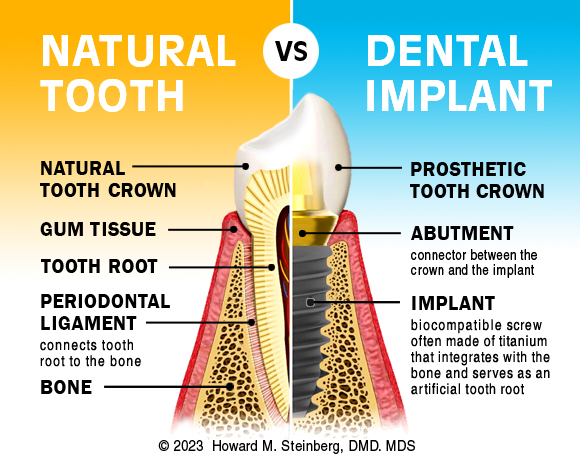What Are Dental Implants?
Posted by Howard M. Steinberg, DMD, MDS
Dental implants are the best alternative to conventional dentures or partials for replacing missing teeth. Placed in the upper or lower jawbone, dental implants function as anchors for prosthetic replacement teeth. A dental implant resembles a small screw, typically 3.0 mm to 5.0 mm in diameter. Dental implants are usually made of titanium — a very strong, biocompatible element that integrates well with bone tissue. Some dental implants are constructed of ceramic or other biocompatible materials. Dental implants provide a very stable anchor for prosthetic dental crowns, a bridge of prosthetic teeth or a full-arch denture.

Comparing Dental Implants to Natural Teeth
Dental implants closely mimic natural teeth. All teeth have roots that extend below the gumline into the jawbone. A dental implant takes the place of a natural tooth root. But instead of a periodontal ligament attaching the tooth root to the bone, a dental implant fuses with the underlying bone tissue in a process called osseointegration. This creates a very strong bond between the implant and the jawbone. Much like a natural tooth root, a dental implant transfers bite forces to the jawbone. A single dental implant can support a prosthetic dental crown that looks and functions like a natural tooth crown. The prosthetic tooth crown is connected to an abutment hidden below the surface of the crown. The abutment firmly connects the dental implant to the prosthetic crown. Only the crown appears above the gumline. When looking at teeth, most people cannot tell the difference between an implant-supported prosthetic tooth and a natural tooth.
Why Get Dental Implants?
Dental implants are an excellent option for people who have lost a single tooth, a few teeth, or for those who are missing all their teeth. Unlike conventional dentures and partials, dental implants ensure artificial teeth will not move around or accidentally come out while eating or speaking. Because a dental implant functions like a natural tooth root, the jawbone is naturally stimulated. This reduces bone loss that often occurs in people wearing conventional, removable dentures. Preserving jawbone tissue helps preserve facial structure. Dental implants allow you to comfortably eat just about any type of food, improving nutritional intake. With dental implants, you can smile, chew and speak with greater ease and confidence.
Are Implants Right for You?
To find out if dental implants are right for you, schedule a consultation with a qualified dentist or dental specialist in your region. Dr. Howard M. Steinberg — a Prosthodontist in Tucson, Arizona — has successfully placed and restored thousands of dental implants.


